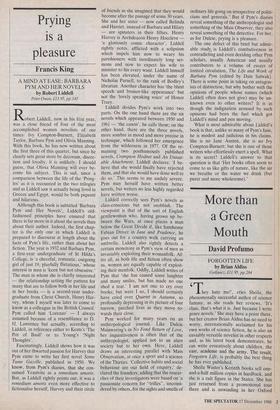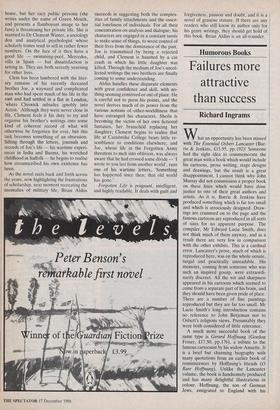More than a Green Mouth
David Profumo
FORGOTTEN LIFE by Brian Aldiss
Gollancz,111.95, pp.284
They hate me!', cries Sheila, the phenomenally successful author of science fantasy, as she reads her reviews, 'It's class, that's what it is. Just because I write genre novels.' She may have a point there, but her creator Brian Aldiss has no need to worry; internationally acclaimed for his own works of science fiction, he is also an enviably versatile novelist in other respects and, as his latest book demonstrates, he can write evocatively about children, the east, academe and the army. The result, Forgotten Life, is probably the best thing he has ever published.
Sheila Winter's Kerinth books sell one- and-a-half million copies in hardback, and she is a cult figure in the States. She has just returned from a promotional tour there and is unwinding in her Oxford home, but her racy public persona (she writes under the name of Green Mouth, and presents a flamboyant image to her fans) is threatening her private life. She is married to Dr Clement Winter, a sociology don and analytical psychologist whose scholarly tomes tend to sell in rather fewer numbers. On the face of it they have a good life — swimming-pool, Mercedes, villa in Spain — but dissatisfaction is setting in. They are both secretly yearning for other lives.
Clem has been lumbered with the liter- ary remains of his recently deceased brother Joe, a wayward and complicated man who had spent much of his life in the east and had settled in a flat in London, 'where Chiswick subsides ignobly into Acton.' Although they were never close in life, Clement feels it his duty to try and organise his brother's writings into some kind of coherent record of what will otherwise be forgotten for ever, but this task becomes something of an obsession. Sifting through the letters, journals and records of Joe's life — his wartime experi- ences in India and Burma, his wretched childhood in Suffolk — he begins to realise how circumscribed his own existence has been.
As the novel reels back and forth across the years, now highlighting the frustrations of scholarship, next moment recreating the anomalies of military life, Brian Aldiss succeeds in suggesting both the complex- ities of family attachments and the essen- tial loneliness of individuals. For all their concentration on analysis and dialogue, his characters are engaged in a constant tussle to make sense of things, to wrest control of their lives from the dominance of the past. Joe is traumatised by being a rejected child, and Clement is haunted by a car crash in which his little daughter was killed. Through the medium of Joe's uncol- lected writings the two brothers are finally coming to some understanding.
Aldiss handles these disparate elements with great confidence and skill, with no- thing seeming contrived or out of place. He is careful not to press his points, and the novel derives much of its power from the various notions of other-worldliness that have estranged his characters. Sheila is becoming the victim of her own fictional fantasies, her brainchild replacing her daughter; Clement begins to realise that life at Carisbroke College bears little re- semblance to conditions elsewhere; and Joe, whose life in the Forgotten Army threatens to melt into oblivion, was always aware that he had crossed some divide — 'I wrote to you last from another world', runs one of his wartime letters, 'Something has happened since then; that old world has gone.'
Forgotten Life is poignant, intelligent, and highly readable. It deals with guilt and forgiveness, passion and doubt, and it is a novel of genuine stature. If there are any readers who still know its author only for his genre writings, they should get hold of this book. Brian Aldiss is an all-rounder.



























































 Previous page
Previous page